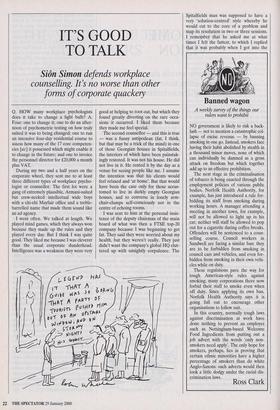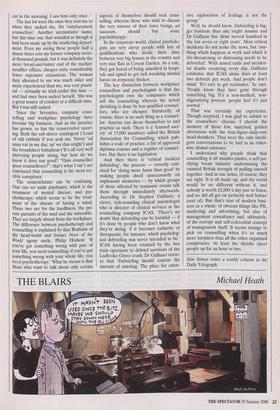IT'S GOOD TO TALK
Sion Simon defends workplace
counselling. It's no worse than other forms of corporate quackeiy
Q. HOW many workplace psychologists does it take to change a light bulb? A. Four: one to change it; one to do an after- noon of psychometric testing on how truly suited it was to being changed; one to run an intensive four-day residential course to assess how many of the 17 core competen- cies [sic] it possessed which might enable it to change in the future; and one to invoice the personnel director for £20,000 a month plus VAT.
During my two and a half years on the corporate wheel, they sent me to at least three different types of workplace psycho- logist or counsellor. The first lot were a gang of extremely plausible, Armani-suited but crew-necked intellectual wide boys with a chi-chi Mayfair office and a treble- barrelled name that made them sound like an ad agency.
I went often. We talked at length. We played mind games, which they always won because they made up the rules and they played every day. But I think I was quite good. They liked me because I was cleverer than the usual corporate dunderhead. Intelligence was a weakness they were very good at helping to root out, but which they found greatly diverting on the rare occa- sions it occurred. I liked them because they made me feel special.
The second counsellor — and this is true — was a funny antipodean (fat, I think, but that may be a trick of the mind) in one of those Georgian houses in Spitalfields, the interiors of which have been painstak- ingly restored. It was not his house. He did not live in it. He rented it by the day as a venue for seeing people like me. I assume the intention was that his clients would feel relaxed and 'at home'. But that would have been the case only for those accus- tomed to live in darkly empty Georgian houses, and to converse in lonely arm- chair-clumps self-consciously not in the centre of echoing rooms.
I was sent to him at the personal insis- tence of the deputy chairman of the main board of what was then a FTSE top-20 company because I was beginning to get fat. They said they were worried about my health, but they weren't really. They just didn't want the company's global HQ clut- tered up with unsightly corpulence. The Spitalfields man was supposed to have a very 'solution-centred' style whereby he would cut to the core of a problem and map its resolution in two or three sessions. I remember that he asked me at what times I felt the fattest, to which I replied that it was probably when I got into the car in the morning. I saw him only once.
The last lot were the ones they sent me to when they sacked me, the 'outplacement counsellors'. Another accountants' name, but this time one that sounded as though it had been made up by the marketing depart- ment. Even my seeing these people half a dozen times cost my former company sever- al thousand pounds, but it was definitely the more bread-and-butter end of the market: scruffier offices, cheaper suits, considerably fewer expensive educations. The woman they allocated to me was much older and more experienced than me, was very practi- cal — certainly no trick-cyclist this time — and had once been sacked herself. She was a great source of comfort at a difficult time. But I was still sacked.
Since the Seventies, company coun- selling and workplace psychology have become big business. And as the practice has grown, so has the conservative sneer- ing. Both the cab-driver contingent (Toad of old rubbish if you arsk me. Never 'ad nana vat in my day, an' we dan oright') and the broadsheet battalions (It's all very well chivvying people along, but how do we know it does any good? "Quis counselliet ipsos counsellores?", that's what I say') are convinced that counselling is the most ter- rible conspiracy.
The nomenclature can be confusing. One can set aside psychiatry, which is the treatment of mental disease, and psy- chotherapy, which seems to be the treat- ment of the disease of having a mind. These two are for the hardliners, the pri- vate pursuits of the mad and the miserable. They are largely absent from the workplace. The difference between psychotherapy and counselling is explained by that Brahmin of the head-world and former News of the World agony uncle, Philip Hodson: 'If you've got something wrong with part of your life, you need counselling; if you've got something wrong with your whole life, you need psychotherapy.' What he means is that those who want to talk about only certain aspects of themselves should seek coun- selling, whereas those who wish to discuss the very essence of their inner beings, ad nauseam, should buy some psychotherapy.
In the corporate world, clinical psycholo- gists are very clever people with lots of qualifications who divide their time between very big houses in the country and very nice flats in Covent Garden. As a rule, they got bored of being assaulted in hospi- tals and opted to get rich wreaking mental havoc on corporate thickos. The key distinction between workplace counsellors and psychologists is that the psychologists own the companies which sell the counselling, whereas the actual shrinking is done by less qualified counsel- lors, who are cheaper. Statutorily, of course, there is no such thing as a counsel- lor. Anyone can deem themselves so and practice as such. There is a `learned soci- ety' of 17,000 members called the British Association for Counselling, which pub- lishes a code of practice, a list of approved diploma courses and a register of counsel- lors. But there is no legislation. And then there is 'critical incident debriefing', the process — recently criti- cised for 'doing more harm than good' by making people dwell unnecessarily on unpleasant memories — by which groups of those affected by traumatic events talk them through immediately afterwards. According to Dr Stephen Galliano, a clever, rich-sounding clinical psychologist who is director of clinical services at the counselling company ICAS, 'There's no doubt that debriefing can be harmful — if it's done by people who don't know what they're doing; if it becomes cathartic or therapeutic, for instance, which psycholog- ical debriefing was 'never intended to be.' ICAS having been retained by the two train operators to debrief survivors of the Ladbroke Grove crash, Dr Galliano stress- es that 'Debriefing should contain the amount of emoting. The place for exten- sive exploration of feelings is not the group.'
Well, he should know. Debriefing is big- ger business than one might assume and Dr Galliano has 'done several hundred in the last seven or eight years'. Most critical incidents do not make the news, but 'any- thing which happens at work and which is life-threatening or distressing needs to be debriefed'. With armed raids and acciden- tal deaths occurring every day, Galliano estimates that ICAS alone does at least two debriefs per week. And people don't mind. 'It's rare to get resistance,' he says. 'People know they have gone through something big. It's a non-medical, non- stigmatising process: people feel it's just normal.'
That was certainly my experience. Though sceptical, I was glad to submit to the counsellors' charms. I cherish the memory of those few, snatched, golden afternoons with the four-figure-daily-rate head-shrinkers. They were the only intelli- gent conversations to be had in an other- wise dismal existence.
I understand why people think that counselling is all mumbo-jumbo, a self-jus- tifying boom industry undermining the vaunted British strength of pulling oneself together. And in one sense, of course, they are right. It is all made up, and the world would be no different without it, and nobody is worth £2,000 a day just to listen, and we did all get on perfectly well before (sort of). But that's true of modern busi- ness as a whole: of obvious things like PR, marketing and advertising, but also of management consultancy and, ultimately, of the corrupt and self-referential concept of management itself. It seems strange to pick on counselling when it's so much more harmless than all the other organised conspiracies. At least the shrinks cheer people up for an hour or two.
Sion Simon writes a weekly column in the Daily Telegraph.



















































































 Previous page
Previous page